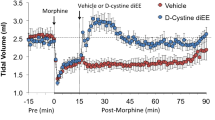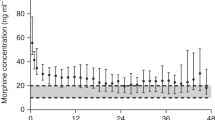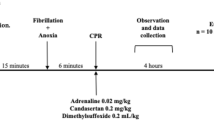Abstract
DURING my investigation of the tolerance for morphine and codeine using ‘coughing dogs’1, I noted that acquired tolerance for these drugs by which their antitussive effects were completely lost was reduced or eliminated by an electric shock or a cardiazol shock. Morphine (2–6 mgm./kgm.) given intravenously completely depressed coughing for 1–6 hr. in such dogs on the first day of administration. By continued daily application of the drug, the dogs acquired tolerance in five to ten days; but the same drug failed to depress coughing afterwards. Similar tolerance for codeine developed in eight to fourteen days. The dogs thus made tolerant for morphine or codeine were subjected to an electric shock (a.c. 90–100 V., 2 sec.) or cardiazol shock (30–50 mgm./ kgm.). On the following day, each antitussive drug was one-fourth to three-fourths as potent, or in a few cases, quite as potent, as on the first day of administration, indicating that the shock had reduced or eliminated the tolerance.
This is a preview of subscription content, access via your institution
Access options
Subscribe to this journal
Receive 51 print issues and online access
$199.00 per year
only $3.90 per issue
Buy this article
- Purchase on SpringerLink
- Instant access to full article PDF
Prices may be subject to local taxes which are calculated during checkout
Similar content being viewed by others
References
Kasé, Y., Jap. J. Pharmacol., 4, 130 (1955).
Goldman, E. E., “Vitalfarbung am Zentralnervensystem”, (Georg Reimer, Berlin, 1913).
Author information
Authors and Affiliations
Rights and permissions
About this article
Cite this article
KASÉ, Y. Effect of Electric Shock and Cardiazol Shock on Morphine Tolerance. Nature 177, 1136 (1956). https://doi.org/10.1038/1771136a0
Issue date:
DOI: https://doi.org/10.1038/1771136a0



